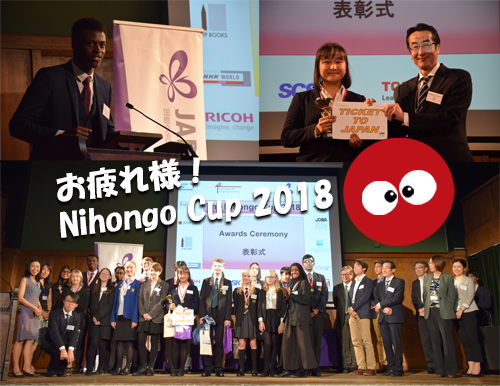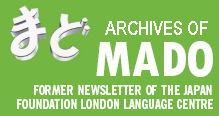21/06/2018

The Finals Day for the Nihongo Cup Japanese Speech Contest for Secondary School Students 2018 was held on 16th June 2018 at Conway Hall in London. It was a fantastic day full of learning, laughter and even a few tears. Students from across the UKs wowed the audience and judges with their entertaining, informative and often moving speeches, ranging from subjects such as wagyu (Japanese beef), Greek mythology, Japan’s shinsengumi and the mating habits of cicadas!
This year, 97 applicants from 22 different secondary schools applied for the contest. The quality of entries was a high standard, but eventually 18 finalists were selected to take part in the finals. Each and every one of the finalists showed fantastic skill – not just as linguists, but as speech-givers who can enthral their audience.
First up were the Key Stage 3 finalists who each gave talks on the theme of “My Ideal Day”. The wide range of interesting speeches coming from a single topic really demonstrated the finalists’ creativity. The winner in the KS3 category was Adrian Manickarajah (Year 9) from Dartford Grammar School, who talked about going to see Japanese cherry blossoms and playing the traditional Japanese game, go. Adrian was awarded with a Kindle presented by SCSK. Second place was won by Emma Troman (Year 9) from Hockerill Anglo-European College. Like Adrian, Emma also wanted to spend her ideal day in Japan, but she chose a Japanese summer’s day rather than a spring one. Finally, Skye Simpson (Year 8) scooped third place by entertaining us all with her dream of spending the day experiencing the life of a samurai, which included waking up extremely early in the morning to study bushido (“the way of the warrior”).
Next, there was an interval, during which James Long played beautiful music on the traditional Japanese flute, the shakuhachi and then it was time for the Key Stage 4 & 5 Pre-GCSE category. This category was for all students at Key Stage 4 and above who had not yet taken GCSE Japanese. This time the students were able to choose their own theme. First place went to Maryam Jaama (Year 11) from Greenford High School, for her impassioned speech on history and the legacy of war. Among her prizes, Maryam was presented with a laptop computer from Toshiba. Kiara Desai (Year 10) from North London Collegiate School swooped into second place with an informative speech on how to learn foreign languages (she currently learns five!). Timi Akinsola (Year 12) from Bexley Grammar School won third prize for his fascinating speech during which he talked about xenophobia in Japan from the perspective of a Japanese-speaking British Nigerian.
Finally, it was time for the Key Stage 4 & 5 Post-GCSE Category, a category for students who are studying Japanese beyond GCSE level. Like the previous category, finalists were free to choose their own topic, but they also had to be prepared to answer questions about their speeches in Japanese. Kei See (Year 13) from Hockerill Anglo-European College wowed the judges with her speech on the shinsengumi (the military police force that was formed in Japan by the shogunate in the late 1800s) and was a well deserving of the first prize, which won her a trip to Japan and a chance to perform her speech there at the international Japanese Speech Award. Second prize was awarded to Anthony Cho (Year 12) from Harrow School, who enthralled the audience with his speech on an unusual subject – cicadas. Ethan Madsen (Year 12) from Westminster School won the third prize in this category for talking about the timely issue of Japan’s shrinking population.
We would like to offer our congratulations to all of the finalists and our gratitude to everyone who helped make the day such an unforgettable experience.
We are very grateful to Japan Centre, JOBA, JP Books, LinguaLift, NHK Cosmomedia, Oxford Brookes University, Ricoh UK, SCSK Europe Ltd, Toshiba of Europe Ltd and A Concept for donating prizes, to the Great Britain Sasakawa Foundation for their generous sponsorship, and to the Embassy of Japan for their support.

The event was organised by the Japanese Language Committee of the Association for Language Learning, in association with the Japan Foundation London.



 Japanese Language Navigation
Japanese Language Navigation
